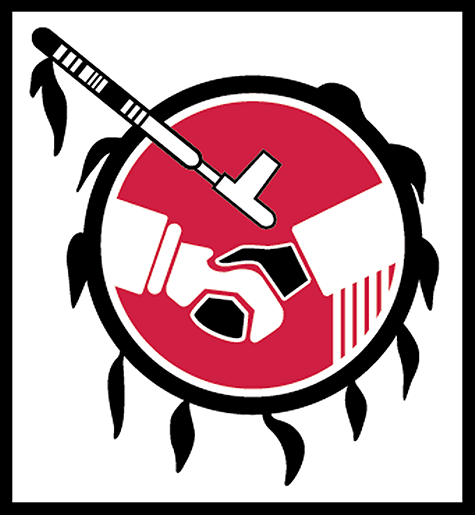
From here to integrity: finding wholeness in a broken worldCOFFEE WITH WARREN, with Warren Harbeck |

|
The Stoney Nakoda First Nation symbol of a handshake in the presence of a sacred pipe within a feathered circle speaks to the importance of integrity. Image supplied So, what do Cochrane old-timer Stu Bradley and the Stoney Nakoda First Nation flag have to say about integrity? Let me take you back to a conversation I had with Stu, but first, a few other thoughts on integrity. Integrity, fundamentally, is about living, speaking and doing the truth. It’s about the richest legacy of all, Shakespeare says – the legacy of honesty. This virtue has long been seen as essential for worthy leadership. “The supreme quality for leadership is unquestionably integrity,” U.S. President Dwight D. Eisenhower said. “Without it, no real success is possible, no matter whether it is on a section gang, a football field, in an army, or in an office.” According to Mahatma Gandhi, integrity is about wholeness in life, notes Cochrane author David Irvine, quoting the father of modern India: “A person cannot do right in one department of life while attempting to do wrong in another department. Life is one indivisible whole.” Since the 1930s the global reconciliation network formerly known as Moral Re-Armament (MRA), and known now as Initiatives of Change, has left an indelible mark on governmental, industrial and race relations through its emphasis on integrity, defined in terms of the Four Absolutes of honesty, purity, unselfishness and love. This is about healing a broken world through challenging its leaders to initiate moral change starting within themselves. Which brings me back to Stu Bradley and a column I wrote on integrity from a rancher’s and First Nation’s perspective. Allow me to close by revisiting that column on “A man’s word was his bond”: COFFEE WITH WARREN, NOV. 11, 2016: Our coffee companion Stu Bradley sat down with me at the Cochrane A&W this week and enriched me with a lesson about a value of the Old West that is fundamental to living together peacefully. Stu is known throughout Alberta as a facilitator of western heritage exhibits, cattle drives, and all-around goodwill. One of his more noteworthy achievements was his vision for the Cowboy Trail. The so-named 735 km stretch of Highway 22 from Mayerthorpe in the north to Cardston in the south weaves together the richness of our foothills ranching and First Nations ways of life. Over our morning coffee we got to talking about the importance of people saying what they mean and meaning what they say. “That’s what the handshake is all about,” he said. Ranchers would seal the sale of cattle and ranchland with nothing more formal than a handshake at the gate, even multi-million dollar agreements. Nothing written, no lawyers, just a solid handshake. “A man’s word was his bond,” Stu said. It was all about trust, honour and respect. Such a view of community reminds me of the symbol of the handshake on the flag of the Stoney Nakoda First Nation. The handshake is between a Stoney and a non-aboriginal person. It is embraced by a circle, reflecting the wholeness of life. A pipe enters into that circle of wholeness to affirm the sacredness of the handshake. This is all about a trust-based relationship that respects our journey together in the land we share. Yes, trust. This is what allows life to proceed in a spirit of harmony and mutual respect. Sadly, too often it seems we have sacrificed that kind of community-building integrity for personal advantage at the expense of the greater circle of life. Our words take one trail, and our actions another. Handshakes of trust and honour are conveniently forgotten. So, whenever we see the Stoney Nakoda flag, let it be a reminder of that fundamental value of which Stu spoke: a person’s word is their bond, sealed with a handshake of trust and goodwill.
© 2018 Warren Harbeck |